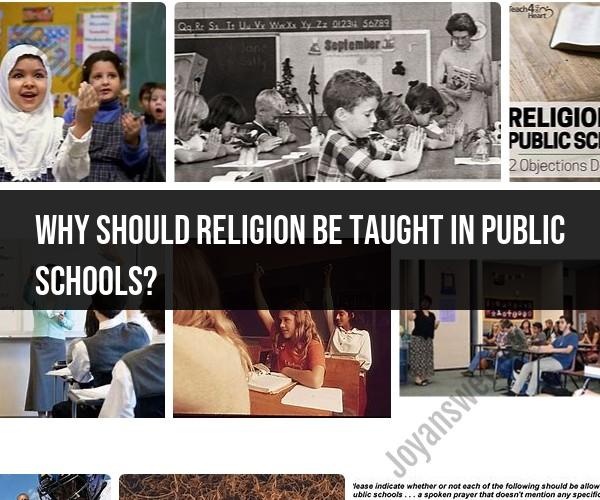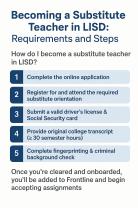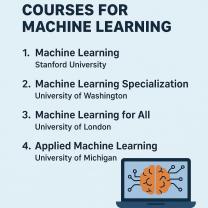Why should religion be taught in public schools?
The question of whether religion should be taught in public schools is a complex and contentious issue. There are arguments both in favor of and against including religious education in the curriculum. Here are some reasons why some people argue that religion should be taught in public schools:
Cultural and Historical Understanding: Religion has played a significant role in shaping the cultures and histories of many societies. Teaching about different religions can help students better understand the world and its diversity. It can also provide context for historical events, art, literature, and architecture.
Promotion of Tolerance and Respect: Learning about various religions can promote tolerance and respect for people of different faiths. It can help students appreciate the diversity of beliefs and develop empathy for those with different worldviews.
Constitutional Considerations: In some countries, including the United States, the First Amendment of the Constitution prohibits the government from establishing or favoring one religion over another (the principle of "separation of church and state"). However, it also protects the right to free exercise of religion. Teaching about various religions in an objective, informative, and non-coercive manner can be seen as consistent with the First Amendment.
Comparative Religion Education: Many proponents argue for the inclusion of a comparative religion education that provides an objective overview of various world religions, their beliefs, practices, and historical contexts. This approach focuses on education, not indoctrination.
Encouraging Critical Thinking: Studying religion can encourage critical thinking and analytical skills. Students can learn to examine and question belief systems, consider ethical dilemmas, and evaluate the impact of religion on society.
Citizenship Education: Understanding religion is relevant in understanding global and national issues. Teaching about religion can prepare students to be informed and engaged citizens in an increasingly diverse world.
Preventing Religious Ignorance and Stereotyping: Some argue that education about religion can prevent stereotypes, misunderstandings, and ignorance that can lead to discrimination or conflict.
Personal Growth and Self-Exploration: For some students, learning about different religions can be a personal and intellectual journey. It can help them explore their own beliefs and values, even if they don't adhere to a particular religion.
It's important to note that the inclusion of religion in public school curricula, if done, should adhere to strict guidelines to ensure that it is taught in an unbiased, objective, and respectful manner. Teachers must be well-trained and sensitive to the diverse backgrounds and beliefs of their students. Additionally, some argue that religious education should be an elective or part of a comparative religion course rather than a mandatory subject.
Conversely, there are also arguments against teaching religion in public schools, primarily based on concerns related to the separation of church and state, potential religious bias, and parental rights. Ultimately, the decision to include religion in public school curricula varies from one educational system and region to another and often depends on local policies and community values.
Religion in Public Schools: Exploring the Debate
The debate over religion in public schools is a complex and controversial one. On the one hand, the First Amendment to the United States Constitution guarantees the free exercise of religion. On the other hand, the Establishment Clause of the First Amendment prohibits the government from establishing a state religion.
Proponents of religious instruction in public schools argue that it is important for students to learn about different religions and their role in society. They also argue that religious instruction can help to promote moral values and character development.
Opponents of religious instruction in public schools argue that it violates the Establishment Clause of the First Amendment. They also argue that religious instruction can be divisive and can lead to sectarian conflicts.
The debate over religion in public schools is likely to continue for many years to come. There is no easy answer to the question of whether or not religious instruction should be allowed in public schools. It is a complex issue with important arguments on both sides.
Teaching Religion in Public Education: Arguments and Perspectives
There are a number of different arguments and perspectives on the issue of teaching religion in public education. Some of the most common arguments include:
Arguments in favor of teaching religion in public schools:
- Religious instruction can help students to learn about different religions and their role in society.
- Religious instruction can help to promote moral values and character development.
- Religious instruction can help to create a more tolerant and understanding society.
Arguments against teaching religion in public schools:
- Religious instruction violates the Establishment Clause of the First Amendment.
- Religious instruction can be divisive and can lead to sectarian conflicts.
- Religious instruction is not necessary for students to learn about ethics and morality.
Perspectives on teaching religion in public schools:
- Separation of church and state: The separation of church and state is a fundamental principle of the United States Constitution. This principle means that the government should not promote or favor any particular religion.
- Religious freedom: The First Amendment also guarantees the free exercise of religion. This means that individuals have the right to practice their religion freely.
- Academic freedom: Academic freedom is the right of teachers and students to pursue knowledge and express their ideas without fear of censorship or reprisal.
The Controversy of Religious Instruction in Public Schools
The controversy over religious instruction in public schools is a complex one. There are strong arguments on both sides of the issue. Ultimately, it is up to each school district to decide how to handle the issue of religion in public schools.
However, it is important to note that there are certain limits on what schools can do with respect to religious instruction. For example, schools cannot require students to participate in religious activities or instruction. Additionally, schools cannot promote or favor any particular religion.
Schools must also be careful to avoid proselytizing, which is the act of trying to convert someone to a particular religion. Proselytizing is not allowed in public schools because it violates the Establishment Clause of the First Amendment.
The debate over religion in public schools is a sensitive one. It is important to be respectful of all viewpoints on this issue.












